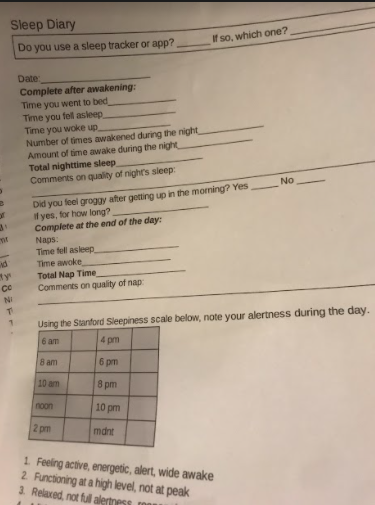A sleep diary; the secret to your waking issues

December 6, 2021
Public education, sports, several extracurricular activities, and the upkeep of social status makes it impossible to leave space for prioritizing sleep. There are many apps in the technology universe that can track this most prized privilege: sleep. These apps can tell you exactly when you fell asleep and woke up and how many times you moved or awakened throughout the night. This data can indicate the quality of your sleep and if you’re getting enough to function properly. Most adolescents are not meeting these unrealistic standards. Now, this is no magical solution to a very complex and inevitable problem, but the tracking and rating of sleep can widely improve our motivation to sleep better. Even the mere awareness of the poor value of our sleeping can urge us to care more about our sleep and take responsibility for our alertness as a whole.
Now, there is no guide on how to do this ‘properly’ or a rulebook for that matter, but when keeping a sleep diary, one may choose to log their dreams; a phenomenon we all experience nightly during our periods of REM, or paradoxical, sleep. However, sleep diaries and dream diaries are not to be confused, but if you’d like to combine the two, who’s to stop you? Dreaming affects us all greatly, and even though we may not always recall said dreams, they influence our waking actions. The process of journaling our sleep allows for introspection that can alter our mindset on our well-being and health. Documenting how long we subjected our bodies to rejuvenation mode each night will tell us if we are taking care of ourselves and if we have our own best interests at heart; without sleep we are merely zombies wandering aimlessly. That may sound harsh but we’ve all experienced this very feeling.
Therefore, keeping a sleep diary can reveal disturbing truths. If one discovers their lack of self care on paper, it can be shocking and disappointing. But with this comes the potential for improvement and the desire to be more well-rested! Along with these discoveries, one may also find their dreams to be symbolic of their lives if they choose to study them.. Dreams contain manifest and latent content. Manifest content is the veiled storyline of the dream, the details we remember and follow. Latent content is the deeper truth to the dream and the message it may be declaring to the sleeper. The act of keeping a sleep diary may help us interpret the latent content that our dreams hold, which can be quite exhilarating. For example; if you dreamed that you were naked in public, something we’ve all experienced at one point, you may interpret the dream to mean that you fear exposure, that you feel insecure or that you fear other people will notice your shortcomings. But this is just one simplistic example of many, and dreams can have much wilder meaning than this. As mentioned above, these two journaling methods are quite different and may produce different outcomes and sleep goals, but the writing down of dreams and the writing down of sleep schedules and naps are both very important.
Students especially are often victims of insufficient sleep. The majority of high school attendees will report that their average nightly sleep time is well below the doctor recommended amount. But the problem of sleep deprived teenagers lies in the mental game of cognitive dissonance. Choosing to spend Saturday nights with friends instead of being in bed by 10 PM, for example, which could leave you pulling an all-nighter and paying the price for the rest of the week. Now, most students don’t even think of it this way, because as shocking as it seems, once we are in debt of sleep, just like money, it must get paid off over time with increased nights of REM rebound, a natural biological response to exhaustion, this according to Myers Dwell’s Psychology, for the AP course. A sleep diary could help to keep us on track to form new beneficial habits that would solve some of these problems. Or maybe teenagers will stay up late and sleep in forever because it’s socially-culturally expected and encouraged, as well as biologically needed. You only live once right? This is just the presented thought process when justifying why one may need to be up until dawn. But this attitude is socially-influenced and conflicts with what is healthy and best for ourselves. Don’t worry, this mindset passes once you’re forced to live in the real world, or better yet, have children.
It may be time to start a daily sleep diary if you’re feeling sleep deprived. Researchers and psychologists recommend this practice because it is easy, insightful and effective. A sleep diary can point out individual sleep problems that may be affecting your waking life such as sleep paralysis, apnea, insomnia, narcolepsy and many more. The openness that a sleep diary requires may be something we are not all ready for, as it can be a very real reflection of our ability to take care of ourselves in the most natural way: sleeping. But like any good habit, once it is practiced and implemented into our lives it becomes second nature. So if you’re unsatisfied with your slumber and your eyes feel too heavy to hold up after 7 PM, consider starting a diary. Just like your waking problems, sleep issues can get better when you write them down. They may even disappear altogether. After all, sleep is the best medicine.
